Toxic Empathy: When Compassion Turns into a Burden
By Marco Franzoni • July 18, 2023
Key Takeaways
- Toxic empathy, where one excessively feels and absorbs others' emotions, can negatively impact mental health.
- Recognizing toxic empathy signs and setting healthy boundaries are crucial to self-care.
- Balance is key in practicing empathy and compassion without falling into emotional distress.
- Strategies like developing self-awareness, taking time off, and cultivating healthy relationships can help navigate and combat toxic empathy.
- Zella Life's coaching services provide guidance on dealing with toxic empathy and cultivating healthier emotional practices.

Empathy – a deeply human trait, a cornerstone for harmonious relationships, a symbol of compassion and understanding. But what happens when this beautiful sentiment becomes a burden, begins to harm instead of heal, and turns toxic? Welcome to the world of toxic empathy.
Our emotional landscape is far more complex than it seems. As we navigate through the labyrinth of our feelings, we sometimes stumble upon paths that lead us astray. One such path is marked by toxic empathy, a phenomenon that occurs when the weight of others' emotions starts drowning our own well-being.
In this article, we delve deep into the realm of toxic empathy, exploring its nuanced definitions, identifying the symptoms, and understanding its impact on our lives. We will also discuss the concept of a toxic empath, a person who, in their attempt to fully understand and share the feelings of others, can lose themselves in the process. This overbearing sense of empathy can even give rise to a seemingly paradoxical entity - the empathic narcissist.
At Zella Life, we are committed to providing insights, guidance, and coaching to help individuals understand and navigate complex emotional landscapes. Whether through business coaching or personal coaching, we seek to empower individuals to foster healthy emotional connections and cultivate resilience in the face of emotional challenges.
As we embark on this journey of understanding and healing, we invite you to join us. Prepare to unmask the hidden dangers of toxic compassion, the damaging side of empathy, and to arm yourself with the knowledge and strategies you need to protect your mental health. After all, understanding is the first step towards transformation.
Let's delve into the world of toxic empathy, and together, let's find the balance between compassion and self-preservation.
For a complete guide on building a strong support system, consider our How to Find Life Balance in 10 Simple Steps article.
Join our Newsletter
Transform your career with our personal growth insights. Get one valuable tip right in your inbox every Saturday morning.
Understanding Toxic Empathy
Empathy, in its most pristine form, is the ability to understand and share the feelings of others. It is a critical part of human connection and compassion. But what happens when this empathy goes beyond the norm and starts to take a toll on one's well-being? Let's take a closer look at the definition of toxic empathy.
Toxic empathy is a state in which an individual's capacity for empathy becomes over-activated, leading them to absorb too much of others' emotional energy, often to their own detriment. This over-absorption can lead to feelings of overwhelm, stress, and emotional fatigue. It can cause individuals to lose touch with their own needs, feelings, and well-being, as they are constantly consumed by the emotions of others. This scenario is akin to the situation faced by a highly sensitive person, who experiences heightened emotional sensitivity and may easily get overwhelmed.
But toxic empathy isn't a standalone concept. It's part of a broader spectrum of empathy-related disorders that include empathy disorder, hyper-empathy syndrome, and empathy deficit disorder.
- Empathy disorder refers to the general condition where one's ability to empathize is compromised. This can result in either a surplus (hyper-empathy) or a deficit of empathy.
- Hyper-empathy syndrome is a condition where individuals feel an excessive amount of empathy, often to the point of taking on others' emotions as if they were their own. This can lead to emotional overwhelm and a constant state of emotional exhaustion.
- Empathy deficit disorder, on the other hand, is the lack of ability or willingness to empathize with others' feelings. This can result in a lack of understanding, compassion, and interpersonal connection.
Recognizing the signs of toxic empathy is a crucial step towards understanding and managing this condition. Symptoms may include persistent feelings of exhaustion, difficulty distinguishing one's own emotions from others', increased levels of stress and anxiety, and a constant need to help or "fix" others, even at one's own expense.
A more extreme case of toxic empathy can give rise to what is known as the empathic narcissist. This may sound paradoxical, as narcissists are often thought to lack empathy. However, an empathic narcissist uses their ability to understand and mirror others' feelings to manipulate them for their own benefit. It is an example of toxic empathy where empathy, far from being a tool for connection, is used as a weapon for control and self-serving purposes.
Navigating the world of empathy disorders can be complex, but it is essential for maintaining your emotional health. For more on this, explore our blog post on what causes imposter syndrome and how to deal with imposter syndrome, which both explore the idea of how others' expectations can impact our sense of self.
Consequences of Toxic Empathy
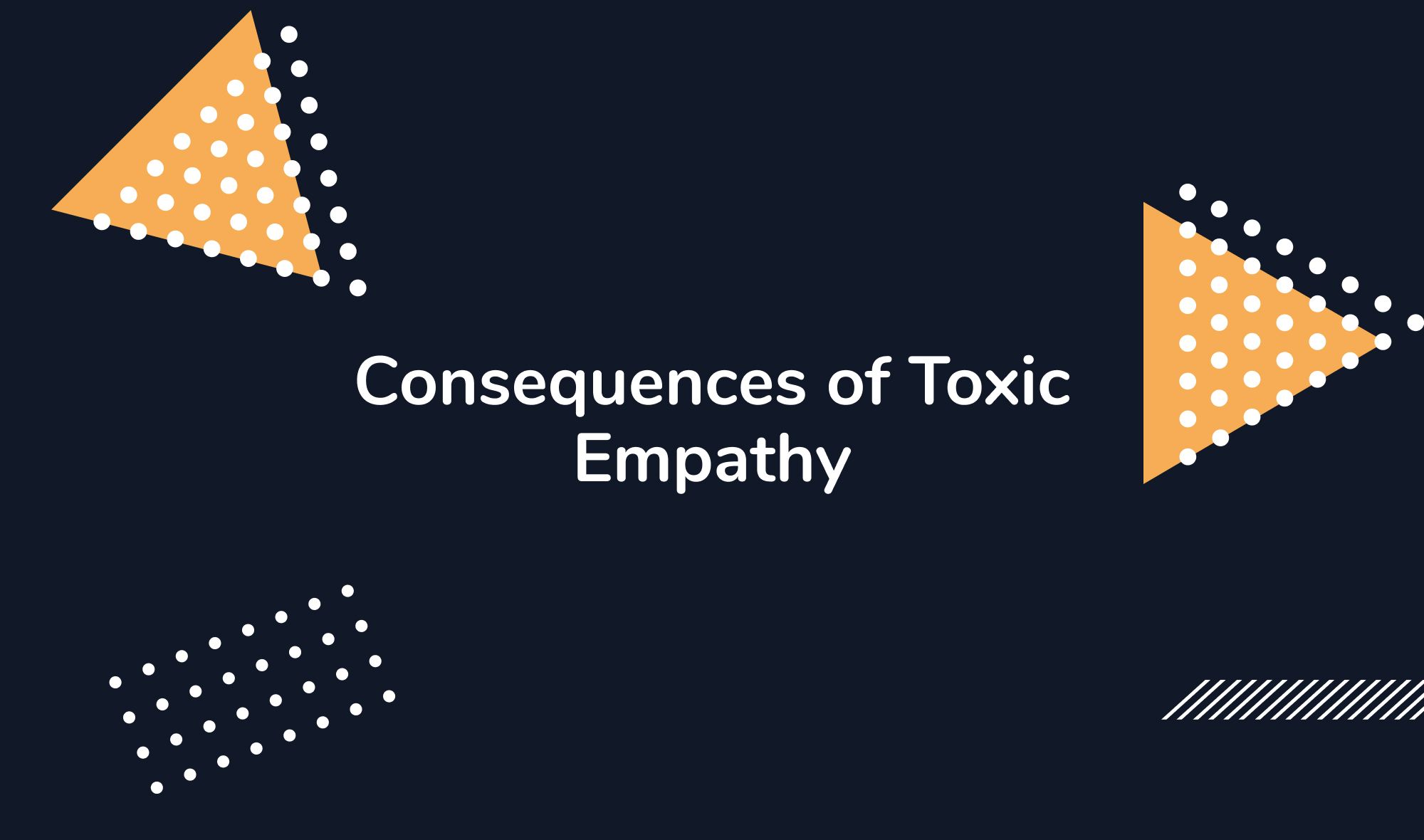
Understanding the impact of toxic empathy on our mental health and everyday life is crucial in order to recognize the need for change. As humans, our ability to feel for others is an integral part of who we are, but when it turns toxic, it can create a ripple effect of detrimental consequences.
Toxic empathy, in many ways, is akin to a poorly controlled fire. Its warmth and light can bring comfort, but when it rages unchecked, it has the potential to consume everything in its path, including our mental health. As a toxic empath, one is in a state of constant emotional absorption from those around them. This can lead to a heightened state of emotional stress, triggering problems like anxiety, depression, and burnout.
Learn more about the science and benefits behind each of these habits in our full article on 20 daily habits for mental well-being.
Moreover, the daily life of a toxic empath can be quite challenging. These individuals often find themselves shouldering others' emotional burdens, leaving them with little energy to address their own needs or to engage in life's pleasures. Over time, they may develop a heightened sense of fear, avoidance, or anxiety towards social situations, further impacting their quality of life.
Join our Newsletter
Transform your career with our personal growth insights. Get one valuable tip right in your inbox every Saturday morning.
Ironically, in their quest to be there for others, toxic empaths often end up isolating themselves. The constant emotional overload can lead to a state of chronic emotional exhaustion, leaving them too drained to maintain a healthy social life. This could contribute to feelings of loneliness, further exacerbating their mental health issues.
The concept of toxic empathy dovetails into the broader idea of toxic compassion. This is where one's desire to alleviate the suffering of others crosses the boundary into self-destruction. Compassion is a virtue when balanced, but when it's taken to the extreme, it can become a vice. Just as a toxic empath absorbs others' emotions, someone practicing toxic compassion may take on others' suffering to a harmful degree, potentially neglecting their own well-being in the process.
In a similar vein, one can draw parallels to self-sabotaging behavior where one's actions unintentionally cause harm to oneself while intending to help others. Also, being overly compassionate can lead to a lack of self-awareness, a necessary skill for maintaining mental health and balance in life.
Protecting Yourself from Toxic Empathy
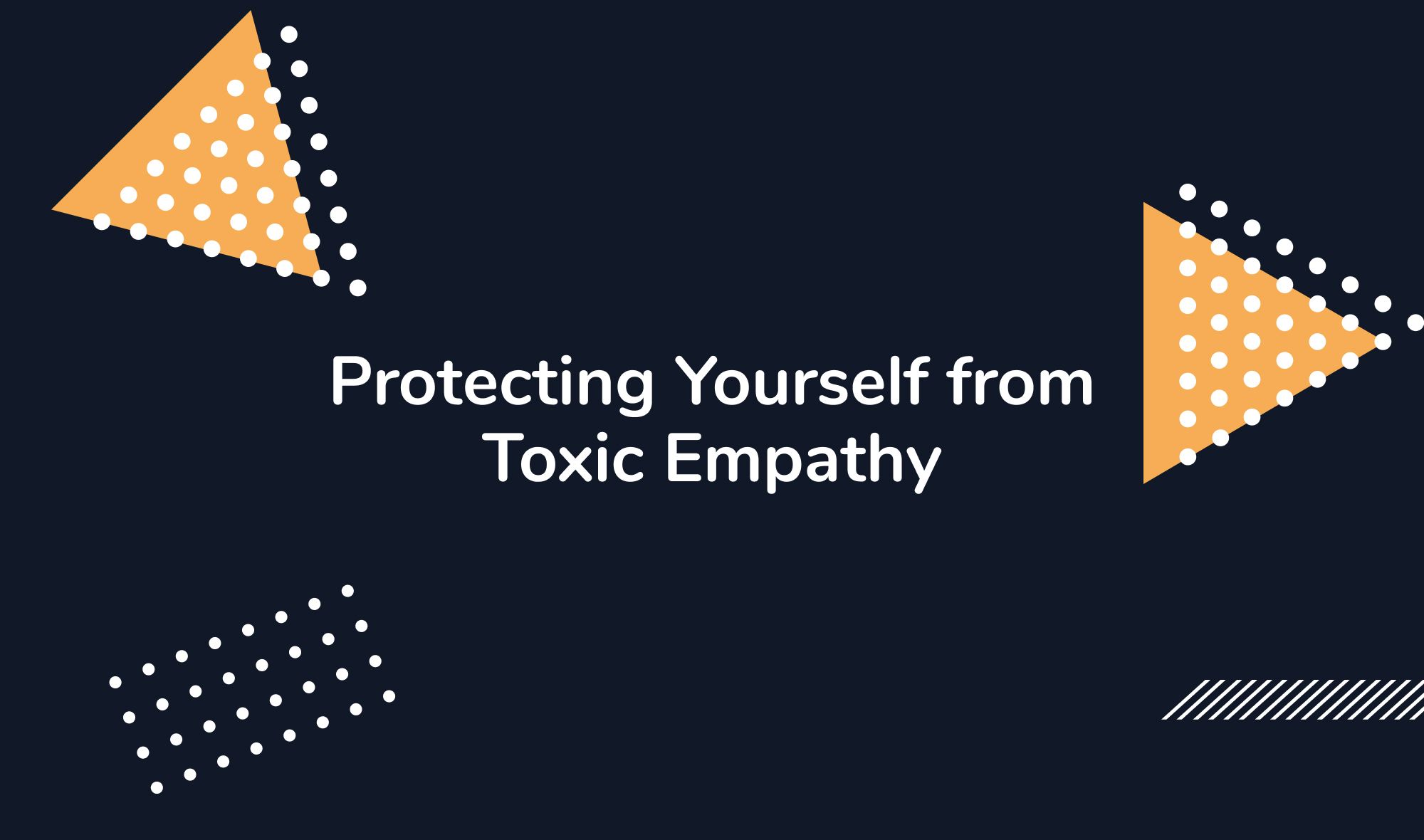
Learning to protect yourself from toxic empathy is vital. Our empathetic nature is a strength that allows us to connect deeply with others, but like any strength, it must be balanced and well-managed to prevent it from becoming a liability.
Firstly, it's crucial to protect your mental health. One of the most effective ways to do this is to cultivate self-awareness. This includes understanding and acknowledging your own emotional state, as well as identifying the emotions you absorb from others. Being aware helps to differentiate between your feelings and those of others, preventing the tendency to carry others' emotional burdens. Developing self-awareness is a journey, and our blog post offers more details on how to embark on it.
Next, establish healthy boundaries. You may find it hard to say no to others due to your empathetic nature, but setting boundaries is essential for self-preservation. These boundaries are not walls to shut people out but a protective shield to keep toxic empathy at bay. Our post on setting healthy boundaries can provide you with some helpful insights.
Learning to protect your energy is equally important. Ensure that you spend time alone to recharge. This could mean practicing mindfulness, meditation, or any activity that helps you unwind and disconnect from the emotions of others. Consider this as taking an 'empathy break.'
If you're looking to overcome adversity and thrive, check out our blog post on Embracing the Opposite of Victimhood for valuable insights and strategies.
To help navigate these complexities, you might also consider seeking guidance from a personal coach, who can provide practical strategies and personalized advice tailored to your specific needs.
Lastly, it's worth noting that prevention is better than cure. Implementing empath protection strategies can help you avoid falling into the pit of toxic empathy disorder. These could involve developing emotional resilience, improving emotional regulation, and practicing mindful empathy where you recognize and validate others' emotions without absorbing them.
The Concept of Empathy
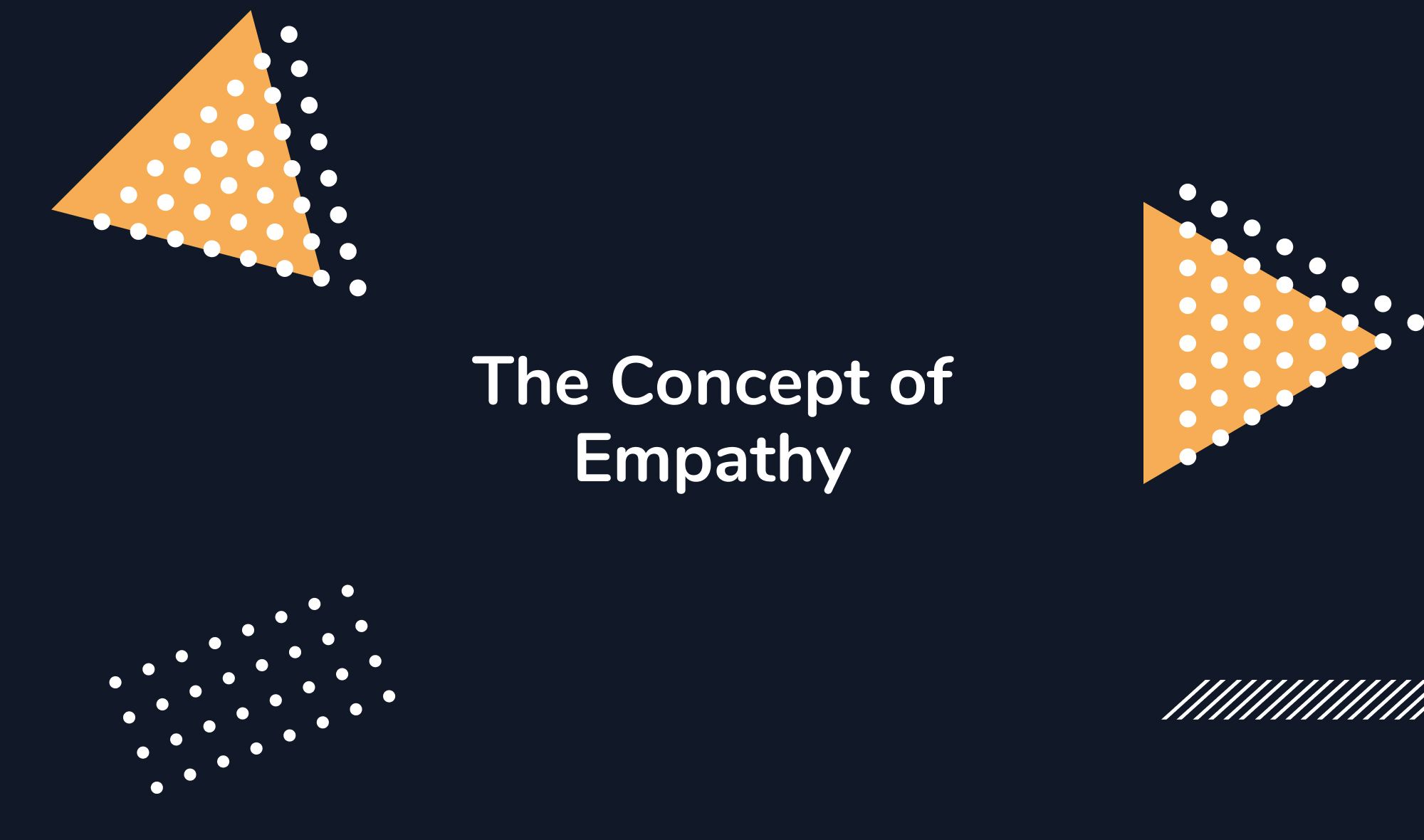
Empathy plays a vital role in our ability to connect with others. It's a powerful tool that, when used appropriately, can foster strong, healthy relationships. But what is empathy, exactly, and how does it relate to emotional intelligence and emotional regulation?
There are two main types of empathy: affective empathy and cognitive empathy. Affective empathy refers to the ability to respond appropriately to another's emotions. It's when we feel sadness when we see someone else crying or joy when we see someone else happy. On the other hand, cognitive empathy, often referred to as 'perspective-taking,' involves understanding someone else's emotions without necessarily feeling them ourselves.
In the realm of emotional intelligence, empathy is key. Emotional intelligence is the ability to identify, use, understand, and manage emotions in positive ways. It's about being aware of our emotions and those of others, which is where empathy plays a crucial role. The more empathetic we are, the better we understand others, contributing to improved relationships both in personal and professional contexts.
For more insights on relationship management and other EQ competencies, read our full guide.
Further, empathy is also fundamental in emotional regulation. It allows us to navigate our own emotions and respond to the emotions of others effectively. However, unregulated empathy can lead to emotional overwhelm. Also, one of the most important aspects of emotional regulation is nurturing self-love. Find out more about this in our blog post on why you should learn to love yourself first.
It is vital to differentiate between healthy empathy practices and toxic empathy. Healthy empathy involves understanding and acknowledging others' emotions without taking them on as our own. It is about maintaining that emotional boundary, which protects us from falling into the trap of toxic empathy. Our blog post on emotional self-awareness provides more insights on how to manage this balance.
In essence, empathy is a vital skill that helps us connect deeply with others. However, like any skill, it needs to be managed and regulated effectively to ensure it serves us rather than burdens us. The key is to cultivate healthy empathy practices while protecting ourselves from toxic empathy. In the next section, we delve into the process of achieving this delicate balance.
Recognizing Toxic Empathy Signs
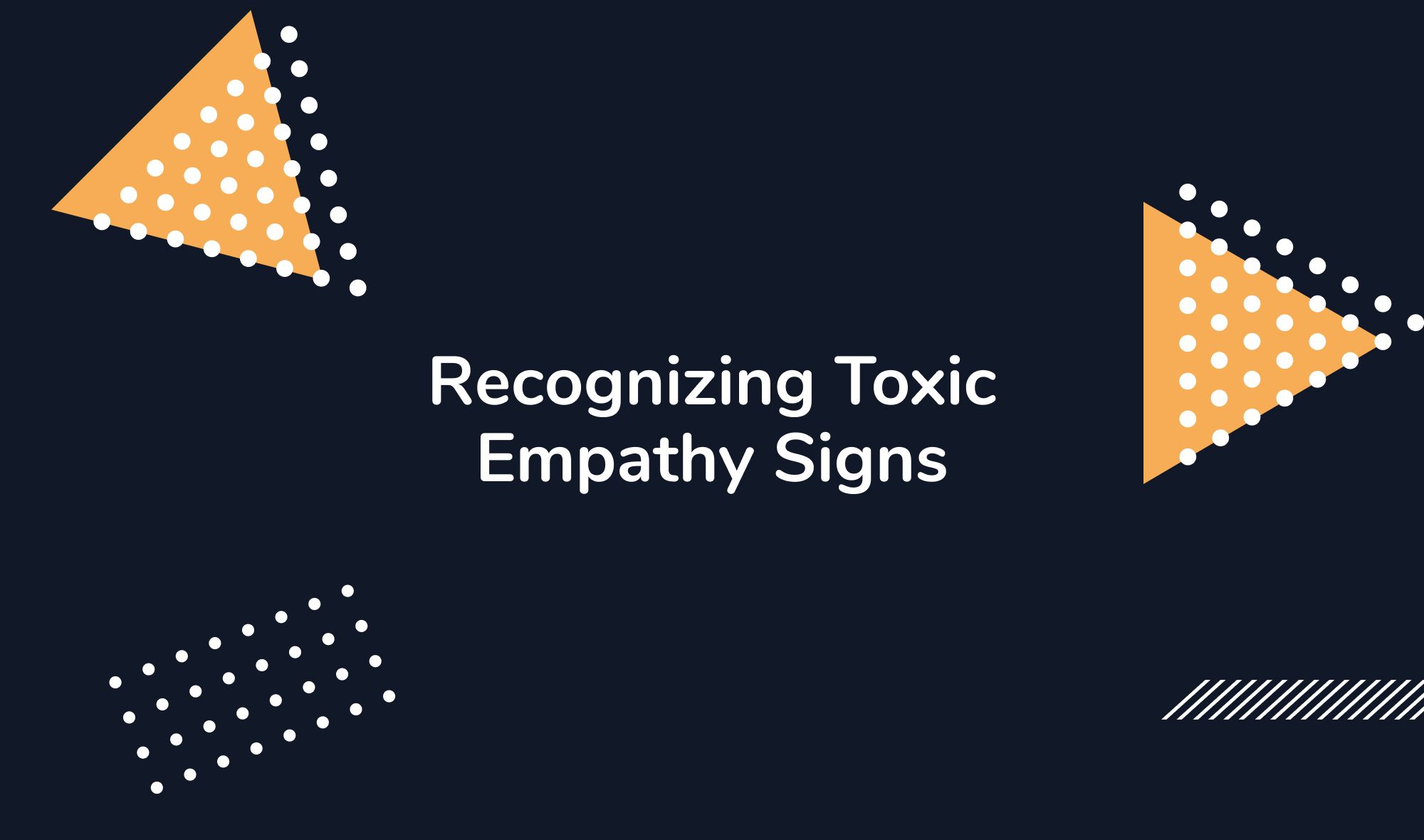
Being able to recognize toxic empathy signs is crucial in understanding when empathy stops being a virtue and starts to become a burden. It's not always easy to discern, particularly because empathy is usually perceived as a positive trait. But becoming hyper-aware of these signs can be a lifesaver in maintaining mental health and energy balance.
If you constantly find yourself overwhelmed by other people's emotions to the point where it affects your well-being, it might be an indicator of toxic empathy. This is one of the primary signs of toxic empathy. It's when you can't distinguish between your feelings and those of others, and their mood significantly influences your mood.
Another signal is when you always put others' needs before your own, often to your detriment. Empathy becomes toxic when it starts to erode your self-care, leaving you feeling drained and exhausted. These are toxic empathy symptoms that should not be ignored. Our blog post on self-sabotaging behavior explores this topic in more detail.
A further sign of toxic empathy is feeling a strong urge to solve everyone's problems. While it's normal to want to help, toxic empathy drives you to take on others' issues as if they were your own. You can become deeply distressed when you can't fix the situation, leading to further emotional overwhelm.
The dangers of falling prey to toxic empathy are immense. Not only can it lead to emotional exhaustion, but it can also result in feelings of resentment towards those for whom you've overextended yourself emotionally. It can affect relationships, leading to feelings of being used or undervalued.
Recognizing the toxic empathy effects on yourself and others is the first step towards healing. Awareness is critical because without it, it's easy to continue in the destructive cycle of toxic empathy.
By understanding the signs, symptoms, and effects of toxic empathy, you are better equipped to navigate your emotional landscape and protect your mental health. In the next section, we'll explore how to establish and maintain healthy boundaries to cultivate balanced empathy.
Cultivating Healthy Relationships and Emotional Connections
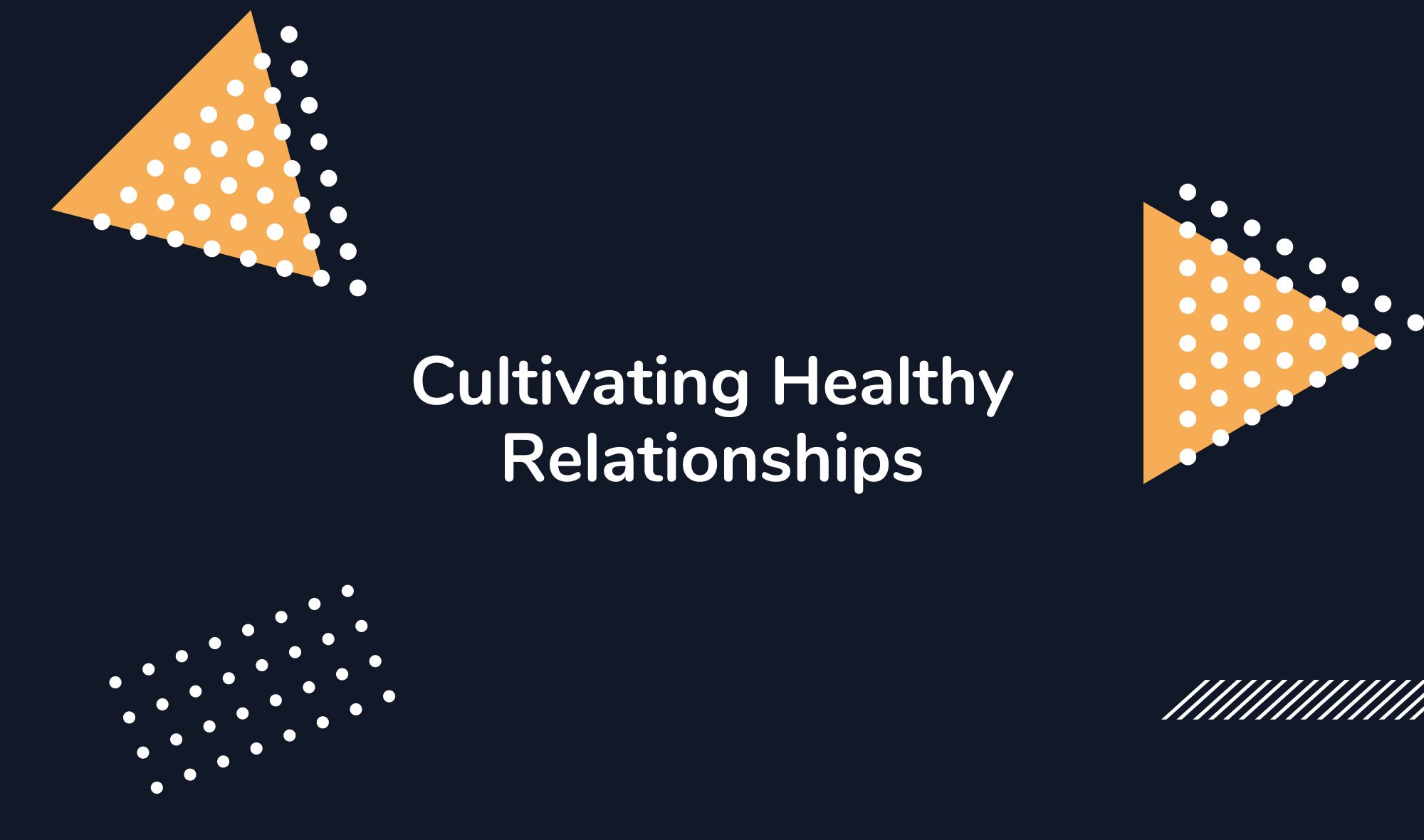
Toxic empathy can often leave individuals feeling depleted, disconnected, and resentful. The antidote to this is to focus on cultivating healthy relationships. A well-nurtured relationship is like a protective shield, providing emotional balance, understanding, and a safe space for sharing your feelings.
Healthy relationships are characterized by mutual respect, understanding, and the setting of healthy relationship boundaries. Boundaries are critical in protecting against toxic empathy as they allow you to decide what is acceptable to you emotionally and what isn't. It's okay to say "no" to taking on another person's emotional burden. It's okay to prioritize your wellbeing. Our blog on setting healthy boundaries further elaborates on this concept.
Another critical aspect of maintaining healthy emotional connections is being open about your feelings. Sharing your feelings is a sign of emotional maturity and strength. Being able to express your emotions openly in a relationship indicates trust and builds deeper connections. It also plays a significant role in emotional regulation, ensuring you're not just an emotional sponge but also have your emotional needs met.
Cultivating compassion is also vital in building healthy emotional connections. Practicing compassion means being understanding and empathetic to others' feelings without taking them on as your own. It is where the line is drawn between toxic empathy and healthy empathy.
By establishing strong boundaries, openly sharing your feelings, and practicing compassion, you can foster relationships that enrich you instead of draining you. This process ensures that empathy, a beautiful human trait, does not transform into a burden, but remains a means for deep, meaningful connections. In the next section, we will dive deeper into practical strategies for cultivating healthy empathy and protecting against toxic empathy. Learn about the roles of middle managers and how it is important for healthy relationships and emotional connections here.
Taking Time Off
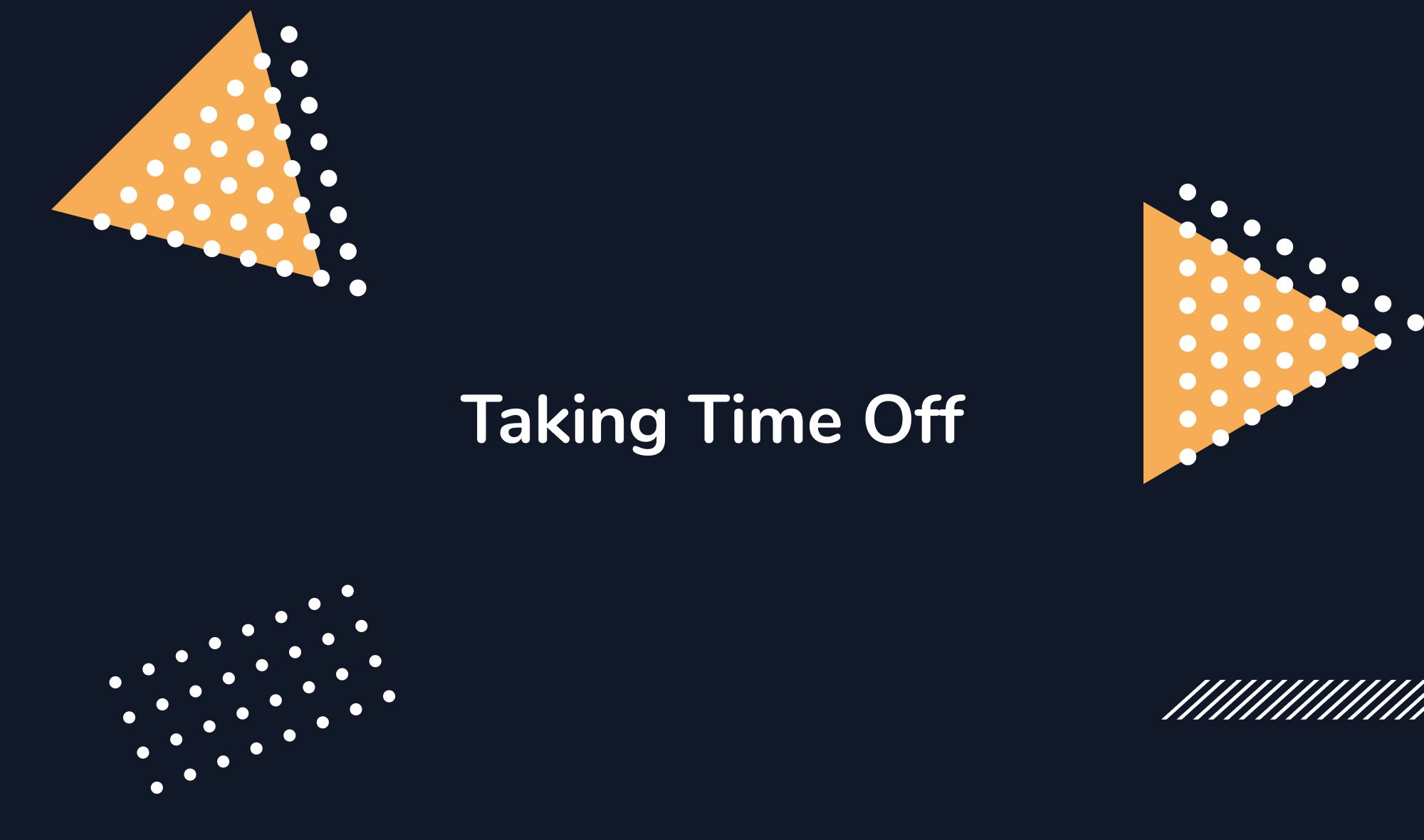
Dealing with others' emotions can be draining, especially for those who tend to absorb those emotions. That's why taking time off regularly and engaging in empathy breaks is crucial in maintaining mental and emotional health.
Time off provides a much-needed breather. It helps replenish your energy reserves, declutter your mind, and regain emotional balance. A well-planned self-care routine can be your shield against the onset of toxic empathy. This routine does not have to be elaborate. Simple activities like reading a book, taking a walk, practicing mindfulness, or even enjoying a quiet cup of tea can make a significant difference.
Alone time activities are essential elements of a self-care routine. They allow for introspection, self-awareness, and the recharging of your emotional batteries. Spending time alone also helps one better understand their emotions and needs, equipping them to deal with others' feelings more effectively. Our blog on how to deal with imposter syndrome discusses the importance of alone time in managing emotional stress.
Remember, taking time off isn't selfish. It's an act of self-love and an essential strategy in protecting oneself against toxic empathy. Empathy is a wonderful gift, but it must be balanced with self-care to ensure it doesn't evolve into a heavy burden. Embrace empathy breaks, invest time in alone activities that bring you joy, and establish a self-care routine that supports your emotional wellbeing. As we delve deeper into empath protection strategies, remember that self-care isn't a luxury, but a necessity.
For additional self-care questions and tips, read our comprehensive post on 45 self-reflection questions to nurture your mind, body, and soul.
Compassionate Actions and Healthy Boundaries

As we navigate the sea of emotions that surround us, the concept of practicing compassion while avoiding the trap of toxic empathy becomes vital. You may ask, 'How can we maintain a balance between being compassionate and preventing empathy from becoming toxic?' The key lies in setting and maintaining healthy boundaries.
In the world of empathy, boundaries are not walls, but filters. They allow us to experience and share others' emotions without letting those emotions overrun us. Establishing these boundaries involves recognizing our own emotional limits and ensuring we don't exceed them, no matter how much we want to support others. We have a useful guide on how to navigate the path to mental fitness, which can assist you in setting these crucial emotional boundaries.
Practicing empathetic compassion, as opposed to toxic empathy, involves maintaining a safe distance that allows you to care about others without absorbing their pain. You can sympathize with someone's situation and offer support without immersing yourself in their emotional turmoil. Our blog post on constructive conflict sheds more light on managing this delicate balance.
Remember that setting boundaries doesn't make you less caring or empathetic. On the contrary, it allows you to practice compassion sustainably, without draining your own emotional reserves. By incorporating effective boundary-setting strategies, you can protect yourself against toxic empathy and maintain your emotional health.
Setting and maintaining boundaries might seem daunting at first, but with time and practice, you can cultivate this essential skill. It will not only protect you from the potential harm of toxic empathy but also enable you to build more robust and healthier relationships. So start setting those boundaries today, and remember, your emotional wellbeing matters.
Highly Sensitive Persons and Emotional Overwhelm
In our exploration of toxic empathy, one group stands out - highly sensitive persons (HSPs). As the name suggests, these individuals possess a heightened sensitivity to emotions, both their own and those of others. While this sensitivity can foster deep connections and empathetic interactions, it also opens the door to toxic empathy and emotional overwhelm.
As an HSP, you might find yourself in a state of emotional overload more often than others, as you're not just dealing with your own feelings, but you're also heavily affected by the emotions of those around you. Your heightened emotional antenna can catch even the faintest signals of others' distress, which can lead to an overabundance of empathy, morphing into toxic empathy. Our article on the culture of engagement explores how sensitivity to emotions can impact your interactions.
Managing emotional overwhelm becomes essential for HSPs. Dealing with overwhelming emotions and emotional exhaustion may seem daunting, but it's far from impossible. Developing self-awareness, as highlighted in our blog post on self-awareness, is the first step. Understanding what triggers your emotional overload and recognizing the early signs of emotional overwhelm can help you take proactive steps to manage your emotional wellbeing.
For HSPs experiencing toxic empathy, coping strategies for high sensitivity are crucial. One effective approach is the practice of 'emotional shielding.' Visualize a protective barrier around you that allows empathy in but keeps emotional overload out. Moreover, incorporate regular 'emotional detox' periods into your routine, where you intentionally spend time in peaceful environments to reset and recharge.
By understanding your high sensitivity and implementing strategies to manage emotional overwhelm, you can turn what might be considered a vulnerability into a strength. It is possible to use your sensitivity to forge meaningful emotional connections without falling into the trap of toxic empathy. With time and practice, you can find the balance that works for you, allowing you to experience the beauty of empathy without the burden of emotional overwhelm.
Self-Awareness and Emotional Health
Navigating the world of emotions can be akin to steering a ship in turbulent waters. One tool that can help you sail through is self-awareness. With the understanding that toxic empathy can distort our emotional landscapes, self-awareness becomes our compass, directing us towards emotional health and away from potential harm.
In essence, developing self-awareness is about gaining a clear understanding of your personality, including your strengths, weaknesses, thoughts, beliefs, and emotions. You may ask, "How does this relate to toxic empathy?" The answer lies in the relationship between self-awareness and emotional intelligence. When you are aware of your emotional state and understand your emotional triggers, you are in a better position to manage and regulate your emotions. You can protect your mental health by identifying and avoiding situations that might provoke toxic empathy.
If you're unsure about your current level of self-awareness or want to work on enhancing it, you can seek assistance from our personal coaching services. Our coaches work closely with you to develop your emotional self-awareness, helping you recognize and respond to your emotional triggers more effectively.
Self-reflection and self-observation are two key techniques for developing self-awareness. Regularly take some time to reflect on your emotions, thoughts, and reactions. How did you feel in a certain situation? Why did you react the way you did? Over time, these self-reflection sessions will give you valuable insights into your emotional patterns and triggers. Our article on imposter syndrome demonstrates the power of self-reflection and self-observation in overcoming emotional hurdles.
Remember, dealing with toxic empathy does not mean suppressing your empathic nature. It means understanding yourself better, so you can continue to care deeply for others without jeopardizing your own emotional health. Your journey to self-awareness is a crucial step towards ensuring that your empathy remains a strength, not a source of distress.
Conclusion
The journey we've embarked on in this article takes us through the complex terrain of emotions and empathy. We've discovered how toxic empathy, a seemingly contradictory concept, can have real and often debilitating consequences. This heightened sensitivity to others' feelings can lead us down a path of emotional exhaustion and distress if we're not careful.
However, empathy in itself is not the enemy. It's a vital part of our social fabric that enables us to connect deeply with others and show compassion. But, like everything else in life, balance is key. A healthy level of empathy lets us care for others while also caring for ourselves.
At Zella Life, we understand these intricate emotional dynamics and offer business coaching and personal coaching services to help you navigate these challenges. Our coaches work with you to recognize toxic empathy signs, protect your mental health, and cultivate healthy emotional practices.
Our aim is to help you establish and maintain that crucial balance. We assist you in setting healthy boundaries, practicing compassion, and developing self-awareness—all vital strategies for protecting against toxic empathy. So whether you are a highly sensitive person dealing with emotional overwhelm, or someone trying to cultivate healthy relationships, remember: balance is key.
By maintaining this balance, we ensure that our empathy—our ability to understand and share the feelings of others—remains a strength that uplifts us and those around us, rather than a source of emotional distress.
In the pursuit of empathic balance, continue your exploration with our blog, where you can discover more about topics such as emotional self-awareness and healthy emotional connections.
Remember, empathy is a gift, and with the right tools and understanding, you can protect this gift from becoming toxic. Stay tuned to Zella Life, and let's continue this journey together towards a more emotionally balanced and healthy life.
Read more about: Well-being, Life Coaching